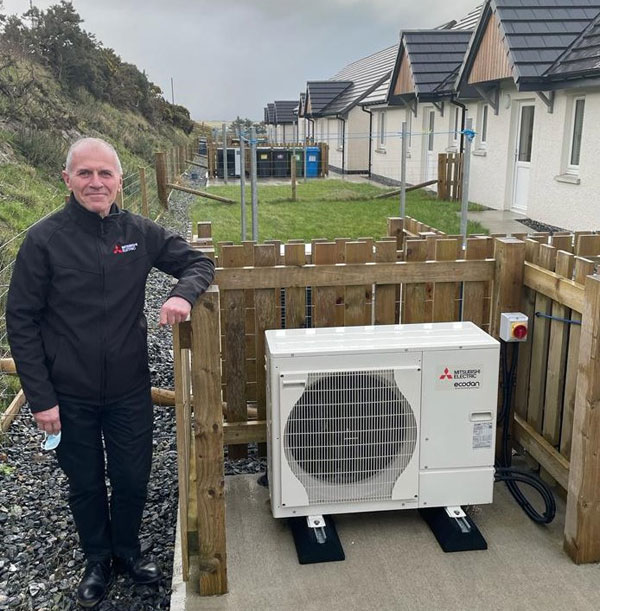 by Ian Heron, Residential Specification Manager – Scotland, Mitsubishi Electric
by Ian Heron, Residential Specification Manager – Scotland, Mitsubishi Electric
Fuel poverty is a serious issue across the UK, especially for families living in old, energy inefficient housing. As the temperatures drop and the cost of energy rises, tackling this issue is high on the agenda – and housing associations, among others, are addressing it as a top priority. To reduce costs, an increase in energy efficiency is a must, and action needs to be taken as soon as possible to lift households out of fuel poverty.
Alongside fuel poverty, achieving net-zero is another key national issue. For housing associations that we at Mitsubishi Electric are working with, these heating options are not mutually exclusive. Not only does an implementation of energy-efficient measures reduce operating costs, it also slashes the carbon impact of providing power to tenants.
In Wales, for example, homes must reach the highest energy standards to reduce carbon use during build and when inhabited. Social housing built with Welsh Government funding will trailblaze the new standards.
Scotland is also making real progress in promoting energy efficiency as a priority for all homes – more specifically in the form of heat pumps. Heat pumps’ low carbon technology contributes to Scotland’s ambitious goals for the climate, and funding provided by the government is helping this become a reality.
Decarbonising new and old properties with heat pumps
Decarbonisation is a significant topic for the Scottish government, especially when it comes to heating houses. The New Build Heat Standard, which was first announced in 2020, is committing to ensuring that, from 2024, all new buildings in Scotland must use heating systems which produce zero direct emissions at the point of use.
Over the past decade, Scotland has made significant progress towards this goal, with fossil fuel-based power generation falling by 70% and the use of renewables tripling. Many housing associations are now going beyond legislative standards and requirements, building homes of a very high thermal quality, with heat pumps delivering space heating and domestic hot water.
However, new builds cannot be the only target. With pre-existing housing associations representing around 280,000 homes across Scotland, energy efficiency and decarbonisation in retrofit situations must also be a priority.
The double benefit of being low carbon and extremely energy efficient makes heat pumps an excellent solution in this situation, and Scotland has already outlined a firm commitment to the use of heat pumps in its Heat in Buildings Strategy. For housing associations across Scotland looking to ensure their buildings are in line with legislation, and continue to be as restrictions tighten, retrofitting with heat pumps will become an essential consideration.
A roadmap to ending fuel poverty
The New Build Heat Standard also outlines a goal of reducing fuel poverty by over 5% by 2040, and we are beginning to see funding come through from the Scottish government to help housing associations achieve these goals. A particular area of focus is on increasing the installer base for heat pumps. For example, the Scottish government’s MCS certification fund can help to pay for 75% of heat pump certification fees up to £1,000, meaning more installers can be trained and ready to install low carbon heating technology.
This is especially important for situations where a large number of heat pumps will need to be installed, such as for a housing association. As a result of this kind of funding, implementing energy efficient solutions becomes much easier for housing associations to do – subsequently leading to lower energy costs and more households lifted out of
fuel poverty.
Grant funding has also become available to housing associations, with £200 million being made available from 2022-2027 for social landlords across Scotland to install zero emissions heating systems. The Social Housing Net Zero Heat Fund aims to cut emissions in a way that supports the eradication of fuel poverty and focuses solely on retrofitted buildings, and its existence will ensure that Scottish housing associations are providing the most energy efficient environment for their residents.
In order for Scotland to reach its ambitious net zero goals, and for fuel poverty to be eradicated, decarbonisation by housing associations is key. By using new grant funding to adopt heat pumps - whether for new build or retrofit projects - housing associations can provide households with clean, low-cost energy that benefits both them and the planet.
Pictured: Ian Heron, Residential Specification Manager – Scotland, Mitsubishi Electric
- Log in to post comments















